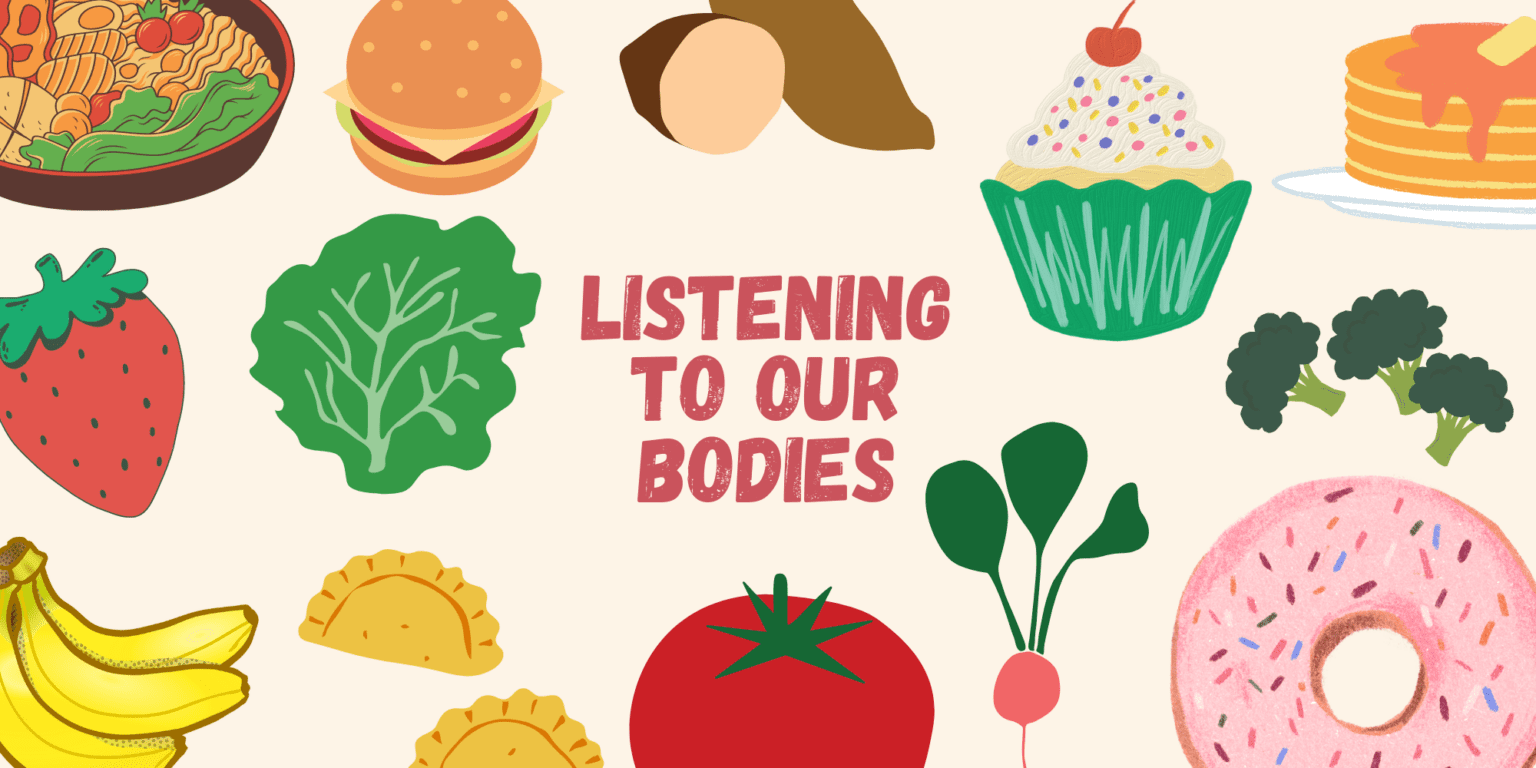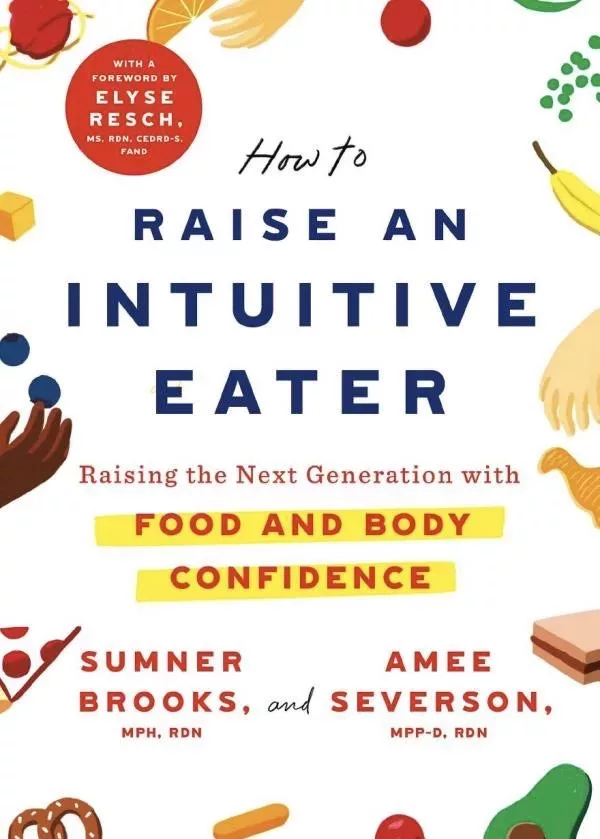
Listening to Our Bodies
You’ve heard of body positivity, but have you heard of intuitive eating? How about body and food neutrality? We spoke with two experts to break down some of these terms, relay a bit of advice, and help you continue your own journey to body and food acceptance.
Why is this important?
“Many times in our society, we judge people — implicitly and explicitly — based on their food choices,” said Dr. Katie Olvera (she/her), a licensed psychologist who specializes in trauma, identity exploration, and disordered eating.
This judgment carries over into our own choices which can affect our mental health as well as our attunement to our body cues. One industry that thrives when we fall into this judgment is diet culture.
Amee Severson (she/they), registered dietician and intuitive eating counselor, is an advocate for anti-diet practices. She defines a diet as any restriction of food, with the only exception being a medical restriction such as cutting out gluten for celiac disease.
“We live in a world that has such a deep influence of diet culture, which is these ideas that there are good and bad foods and the right and wrong ways to eat,” they said.
Food should not have moral value. This assignment of morality — “good” and “bad” — to types or amounts of food can worsen self-judgment and lessen our ability to follow our body. Dr. Olvera promotes a mindset of food neutrality for both physical and mental benefits.

Food Neutrality and Body Neutrality
“Food neutrality is when someone has a mentality that ‘all foods fit’ and that our worth/value in society is not impacted by what we eat,” Dr. Olvera said. ‘All foods fit’ means that there is no restriction of any kind of food group or type of food in one’s diet unless there is a medical reason. This includes so-called ‘junk food.’ This allows a person to eat what they want, whenever it sounds good, and to eat as much as they need to feel satiated.”
She ensures that there are many benefits to a food-neutral mentality.
“Mentally, when someone is operating from a food-neutral standpoint, they might feel more empowered in their food choices, as they are not following any food rules,” she said. “Psychologically, it can reduce or prevent anxiety, comparison, and negative self-talk around food and body image. Since it can allow someone to follow their own internal hunger/fullness cues, they’re more likely to be fully nourished and satisfied, which can lead to physical benefits like stabilized energy and balanced internal functions.”
Food neutrality is when food is morally neutral. Many people equate their food choices with their morality. Severson provided some examples:
“I’m so bad for eating this cake. I am going to have to make up for this later.”
“I’m being good, so I’m gonna eat the salad.”
She emphasizes that this mentality of morally righteous food choices bleeds into body judgment. With food neutrality, our choices with food also become neutral. Severson suggests that gratitude is at the root of body neutrality.
“We live in this world where you’re constantly getting messages that your body is not positive,” they said. “So body neutrality is like being able to look in the mirror and be like ‘this is okay, this is a body that helps me exist, helps me move’.”
Wondering how to get back in touch with your hunger and fullness cues and how to move toward food neutrality? It’s all about food confidence.
Food Confidence
“Food confidence is the ability to exist with your food and feel safe around it, to feel like you can eat it, and eat it,” Severson said. “To feel like you can make choices around it. [They’re] super connected — food and body confidence.”
She suggests that when you’re confident with your food and confident in a neutral opinion about your body, you can exist knowing you, your food choices, and your body are valid and important. With that knowledge you can eat whenever you’re hungry, stop whenever you’re full, and reach for the items you’re craving without judgment. With that knowledge, you can practice intuitive eating.
Intuitive Eating
Intuitive eating came out of research by dieticians who found that dieting was not working for clients and would often lead to concerning behavior, Severson said. One of the largest side effects of dieting is eating disorders. One of the most preventative measures for eating disorders is having a positive relationship with food modeled in the home for kids. Intuitive eating is one way to have this positive relationship by eating when and what your body asks for.
These are some of the reasons Amee Severson became an intuitive eating counselor and co-wrote How to Raise an Intuitive Eater.
“I like to describe [intuitive eating] as this space of being able to trust your body and trust your body’s needs, and to listen to it, especially without the noise of diet culture,” she said. “Without the noise of the shoulds and shouldn’ts and the rights and wrongs of what every food rule tells us. Instead, we trust what we need and what our body will benefit from at any given moment. And we trust that we can exist in this framework [of eating what we crave and when we crave it] and will be okay.”
Suggestions for Implementing These Concepts
One way to begin is by buying more types of food!
“Generally, the more variety the better! Challenging yourself to go outside of your food ‘comfort zone’ can be a way to increase the variety of food options,” Dr. Olvera suggested.
This way you will always be able to listen to your body’s hunger cues and cravings. Hunger and fullness cues can look different for each body, but some general signs of hunger are fatigue, cravings, and a growling stomach.
Severson suggested we try buying what we want and not putting it back on the shelf for the “better” option.
“What if you didn’t shame yourself for buying food?”
Now What?
If this is the first time you’ve heard these concepts, it can be overwhelming! Seek out more resources that provide deeper definitions and tips, or seek personal support.
“If someone is struggling to come up with a plan that is fully nutritious, or they find that they are struggling to feel that it’s ‘okay’ to buy or eat certain foods, meeting with a dietician could be really helpful,” Dr. Olvera said.
Amee Severson recommended:
Books:

- How to Raise an Intuitive Eater by Sumner Brooks and Amee Severson
- Intuitive Eating by Evelyn Tribole and Elyse Resch
- Anti-Diet by Christy Harrison
- Body Respect by Linda Bacon and Lucy Aphramor
- Reclaiming Body Trust by Hilary Kinavey and Dana Sturtevant
A Podcast:
Food Psych by Christy Harrison
In addition to consuming new media, Severson encourages all of us to think critically about why we won’t buy certain products. For example, are you avoiding chocolate cake because it makes your body feel bad or because you’ve been told it’s a bad food?
“In order to really hear your body, it does take some unpacking from some of these things, and figuring out beliefs and feelings about food and your body,” Severson said. “This includes learning to trust your hunger cues.”